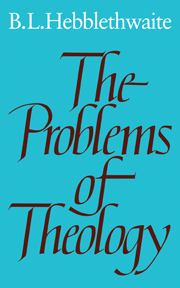7 - Ethical problems
Published online by Cambridge University Press: 30 September 2009
Summary
Theory and practice in religion
So far in this book we have been concerned almost entirely with theoretical problems, and especially with the relation between theology and other subjects, such as history, philosophy, social science and comparative religion. We have concentrated on theology's attempt to understand, through critical study and rational reflection, the facts about God, man and the world. We shall, in the final chapter, continue this theme by asking to what extent, in the light of the problems discussed, it is still possible for a religion such as Christianity to put forward doctrines to be believed.
This whole approach, however, is open to serious criticism. Reference was made at the end of Chapter 1 to the Marxist–Leninist view that our task is not to understand the world but to change it. This sense that practice comes first and theory, if at all, only second, is shared by many for whom a religion is primarily a way of life. From time to time we have mentioned that strand in the philosophy of religion, from Kant to Braithwaite, which sees the doctrinal element in religion as only a pictorial way of reinforcing certain ethical ideals. This is hardly true to the phenomenological reality of the world religions, as we have seen, but it remains the case that all religions include a strong ethical element. Buddhism's analysis of the human situation is made in the interests of a practical cure. Hinduism has always taught the eternal dharma, a word which means both ‘righteousness’ and ‘religion’.
- Type
- Chapter
- Information
- The Problems of Theology , pp. 124 - 141Publisher: Cambridge University PressPrint publication year: 1980

